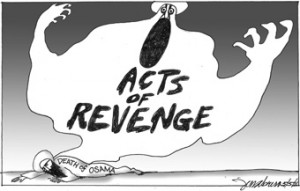Less cruel
 THREE DAYS after American commandos killed al-Qaida founder Osama bin Laden, more details are still emerging. The implications of his death, too, are still far from clear. But this much is certain: The man whose lifework was built on a readiness to kill thousands of innocent lives had himself met a violent death. Justice, if understood in terms both ancient and poetic, has been done.
THREE DAYS after American commandos killed al-Qaida founder Osama bin Laden, more details are still emerging. The implications of his death, too, are still far from clear. But this much is certain: The man whose lifework was built on a readiness to kill thousands of innocent lives had himself met a violent death. Justice, if understood in terms both ancient and poetic, has been done.
The confusion over details was evident almost from the beginning, with many first-day news stories following US President Barack Obama’s dramatic, televised announcement reporting conflicting information: the number of US military helicopters used (two, three, or four); the extent of Pakistani cooperation (from non-existent to joint involvement); the number of shots to Bin Laden’s head (one or two); and so on. This confusion was present even during the first conference call conducted by “senior administration officials” immediately after Obama’s announcement, the full transcript of which can be read online. In that call, the officials who spoke anonymously but on the record gave conflicting details (for instance, about whether the woman who was allegedly used as a human shield was Bin Laden’s wife or not).
Even though there has been a pronounced effort on the part of the White House to provide as much information as possible on the killing of Bin Laden, the sketchiness of the overall picture is only to be expected, for at least two reasons: first, in the initial news cycle, there was only one kind of source for all the information: insiders at the White House; and second, even those insiders were one step removed from the actual operation, dependent on what communications technology allowed them to see and hear. It will be some time before the full story can be told.
The implications of Bin Laden’s death are a matter of debate. Leaving aside the issue of next year’s US presidential elections, how will the movie-like takedown of the world’s most wanted man affect the Age of Terrorism he had himself created? Most terrorism experts agree about the short term: We can expect some form of retaliatory attacks, even in the Philippines. The Aquino administration is right to take the possibility of risk seriously.
It is difficult to imagine al-Qaida itself, however, as surviving in its present form in the medium term. This is not to say that survival is out of the question, only that al-Qaida’s structure of a powerful symbolic center and decentralized units (“franchises,” as even terrorism experts have come to call them) will be unwieldy without a Bin Laden, an ideologue-warrior with a compelling personal history. Will this make the struggle to end terrorism harder to achieve? Only time will tell whether the branches (like the fearsome al-Qaida in the Arabian Peninsula or, closer to home, affiliates like Jemaah Islamiyah) will thrive without Bin Laden, or wither on the terrorist vine.
As some observers have noted, however, Bin Laden died past his prime as a global icon. If he had been killed seven or eight years ago, mass rioting and other public demonstrations of sympathy and support would have roiled parts of the Middle East. This week, we have barely seen any sign of that. Part of the reason must lie in the growing realization that an ideology that routinely calls for the death of innocent Muslims must be profoundly anti-Islam. Part must lie in the democratization wave sweeping through the region.
To be sure, the fate of the so-called Arab Spring still hangs in the balance. For every signal triumph like Tunisia and Egypt, there are cautionary examples like Libya and Syria. But it is indisputable that millions of ordinary citizens in Muslim-majority countries have voted with their feet, assembling makeshift parliaments of the street to demand greater personal and political freedom.
In other words, the baleful influence of Bin Laden, while still potent, was increasingly being pushed to the margins. Who knows? Perhaps in a few more years, he would have become thoroughly marginalized, ignored, embittered by isolation. In that sense, death at the hands of US Navy Seals may have been less cruel than dying of heartbreak.















